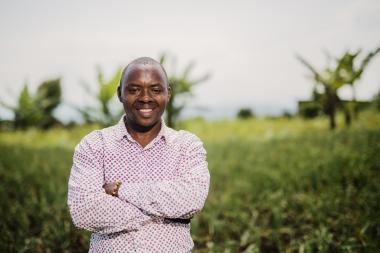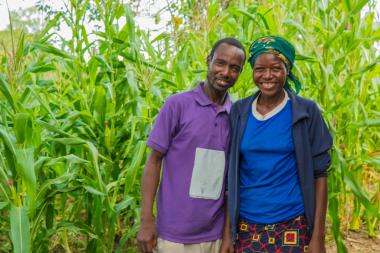Every day, Women for Women International celebrates the women that we serve and their unwavering strength in the face of unknowable adversity. And today, on International Men’s day we celebrate the men committed to using their influence to create a better tomorrow in their communities, for both women and men.
Because gender equality isn’t just about more choices for women: it opens the door for men to practice positive masculinity and have more choices in how to live their own lives. We are proud to have men who work in our programs and men who participate in them who demonstrate that equality strengthens everybody.
Our president Laurie Adams shared a story of positive male leadership from a graduation ceremony in Rwanda. “800 women were graduating from our program. Thousands of people walked for miles to attend the grand ceremony – part of which was a skit performed men in our program. In front of all gathered, they roleplayed as caregivers, taking an active role in their families,” she said. “They showed that men can care for children and do household chores. In the middle of the scene was the village chief. Men testified that it was seeing the chief participating that allowed them to feel safe to take on more roles.”
Men play active roles as part of our staff. Emmanuel, one of our agricultural vocational trainers in Rwanda, helps his class of women by teaching them proper pesticide use and to understand market demand. "I love my job because it entails helping women to get out of poverty and change their lives," he says, “I’d love for women to continue farming and working together and join cooperatives so they can free themselves from poverty.” Because of our staff like Emmanuel, we can directly affect women in conflicted countries so that they can rebuild their lives, their families, and their communities.
When Marie Clarke, our Vice President of Programs, visited Afghanistan, she spoke with men in our country office who work to create a better, more equitable future. Marie reported that, amid the regular danger and conflict that our team and participants face, our staff of men and women continues to keep the program going.
Small celebrations provide a light in the darkness. In Afghanistan, it is traditional to celebrate the birth of a male child but not typically a female child. One of our country staff considered the inequality this creates for fellow staff members welcoming a daughter, so our office decided to break convention and celebrate all children. The men on our staff are proud to be fathers to daughters. We hope that small changes, even within our office, can create a ripple effect and eventually cause change within local communities and leadership.
Male staff play an important and sometimes dangerous role mediating inevitable pushback against measures to achieve gender equality. They engage directly with men in our Men’s Engagement program to explain that, while in the past they may have believed or done something harmful to women, they can use their voices to advocate for women’s rights.
Of course, changing the way one interprets gender is difficult. Men’s discussion covers sensitive topics like land inheritance, property rights, and household gender roles. To facilitate conversation and mediate some of these issues, our program staff collaborate with local male leaders and religious leaders to discuss issues like legal rights, positive masculinity, and gender roles.
Our Nigeria program communicated that some men saw the local leadership’s advocacy as an eye-opening perspective that helped them make healthier decisions for themselves and become more active in their families.
“In the past my husband used to come home really late, when the children were asleep, so he didn’t spend any time with the family,” says Biskilda, a program participant from Nigeria. “The little money he had he would spend on drinking. Now it’s completely different. After he comes back from the farm, he helps me cook and bathe the children. He has even asked me for forgiveness for his past behavior.”
In South Sudan, our Economic Empowerment Officer, Moses Abure, helped lead the process to reopen our programs, including Men’s Engagement programs. In those discussions, Moses reported that men are raising issues on how to support future generations. “[Men] have said, ‘It’s great that you are working with women, and you are involving the husbands too, but there is a gap – what about our children? Our children are getting a bad reputation.’ That is some feedback we have had,” Moses said.
Women for Women International continues to grow our Men’s Engagement program and an understanding that sharing power is actually growing it – for everyone. Without the support of men in each of the countries we serve, our women could not make the progress that they have and continue to make.
Happy International Men’s Day, and thank you to the men who are making a difference across the world!


